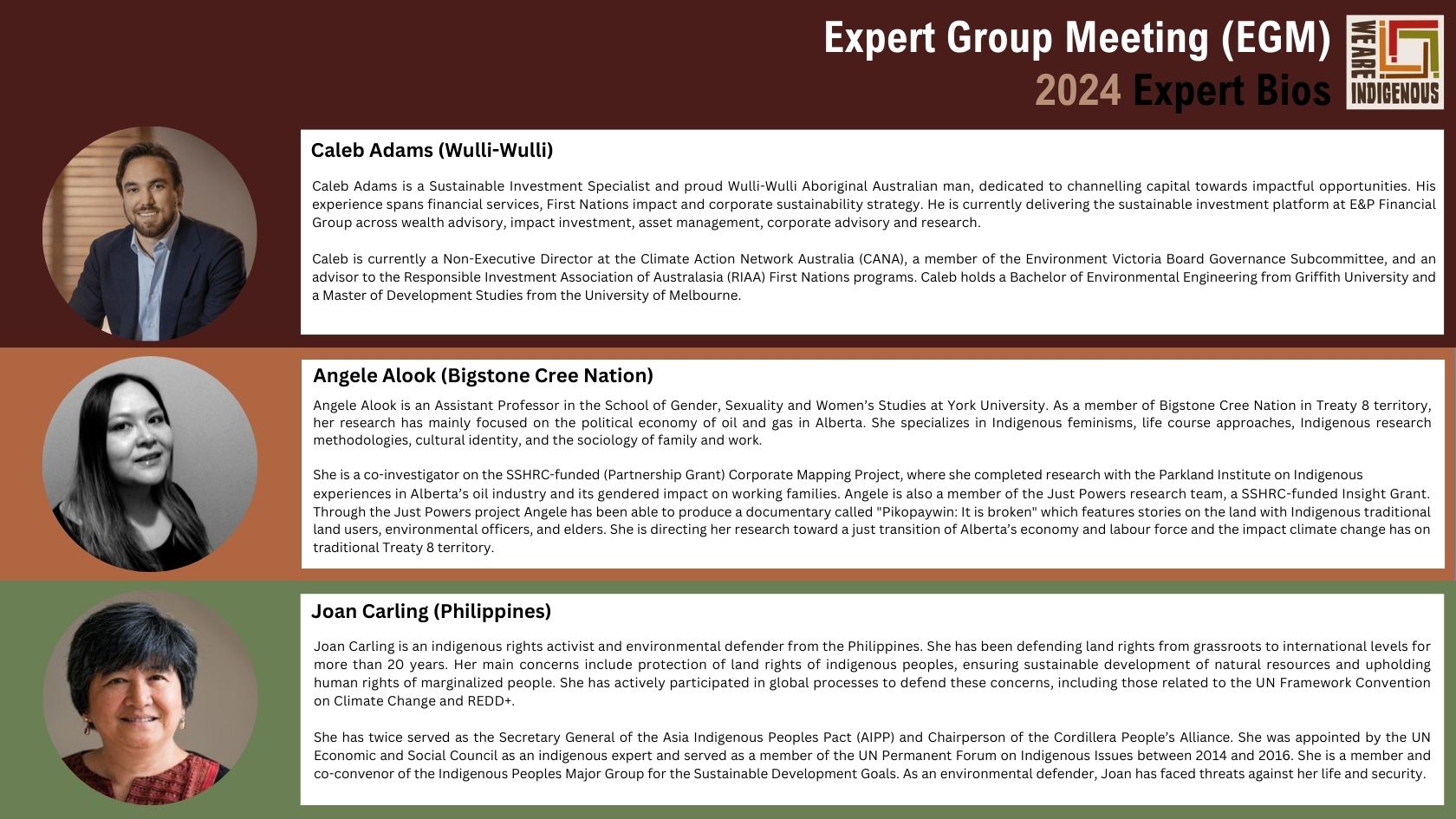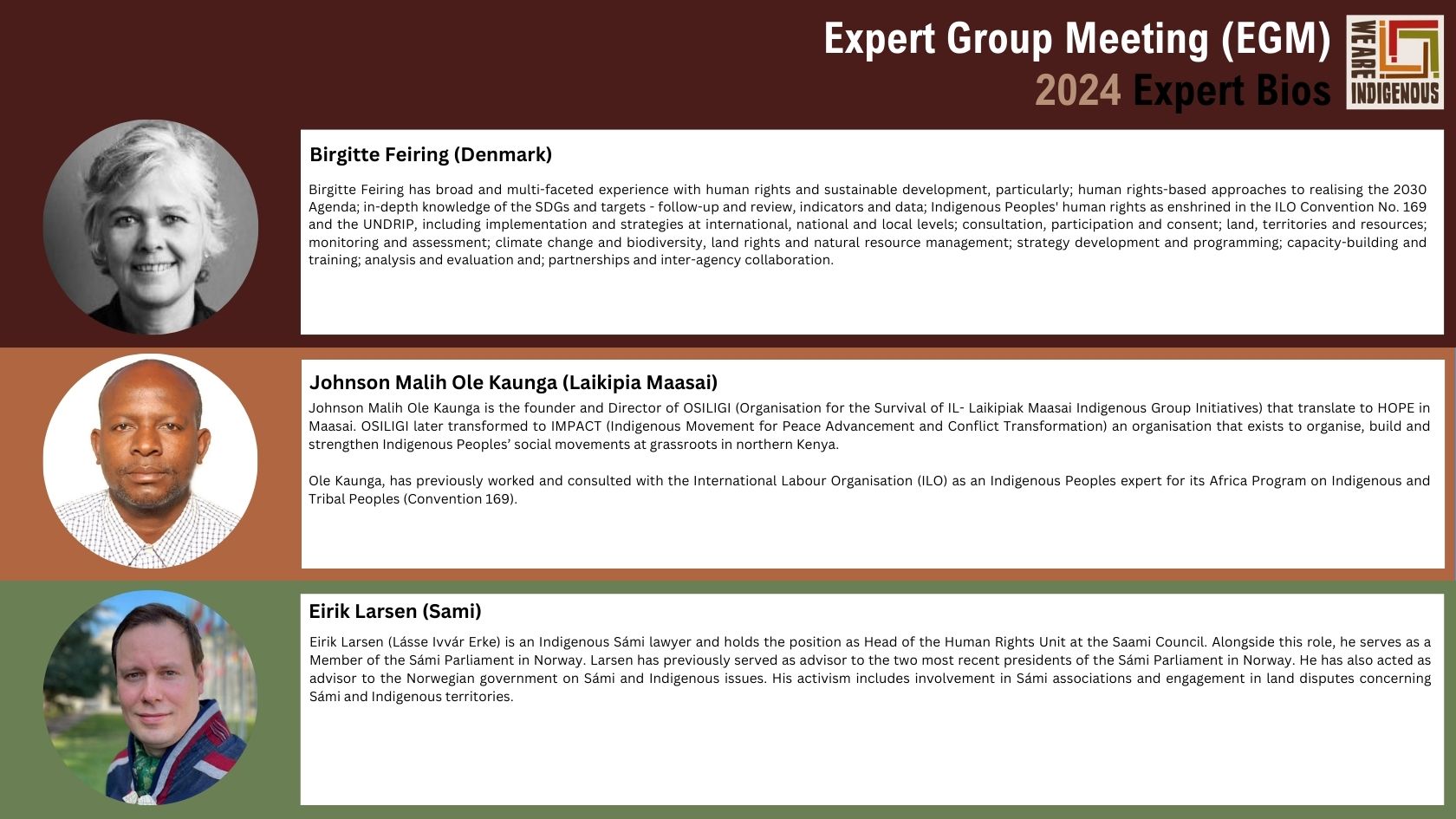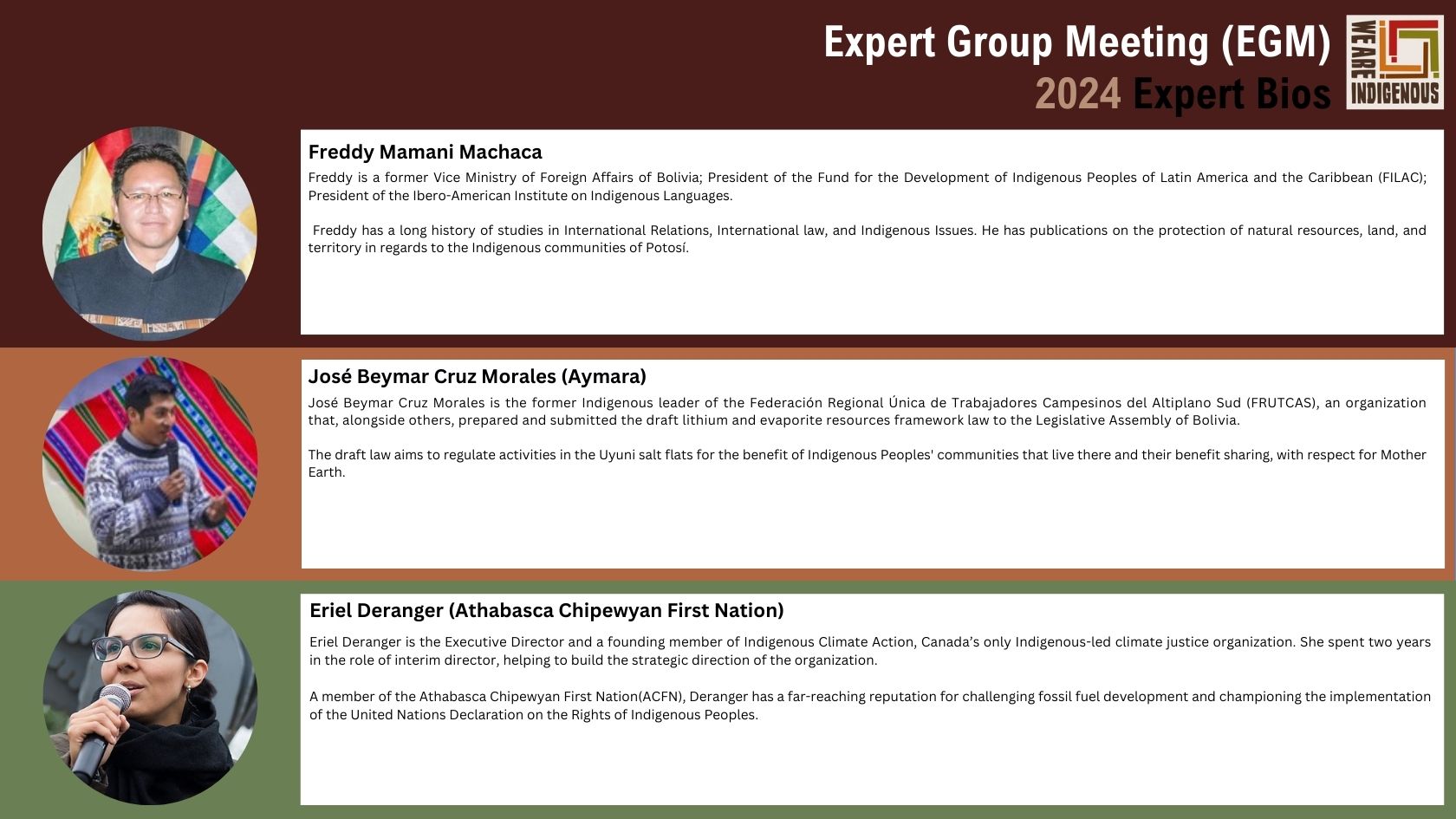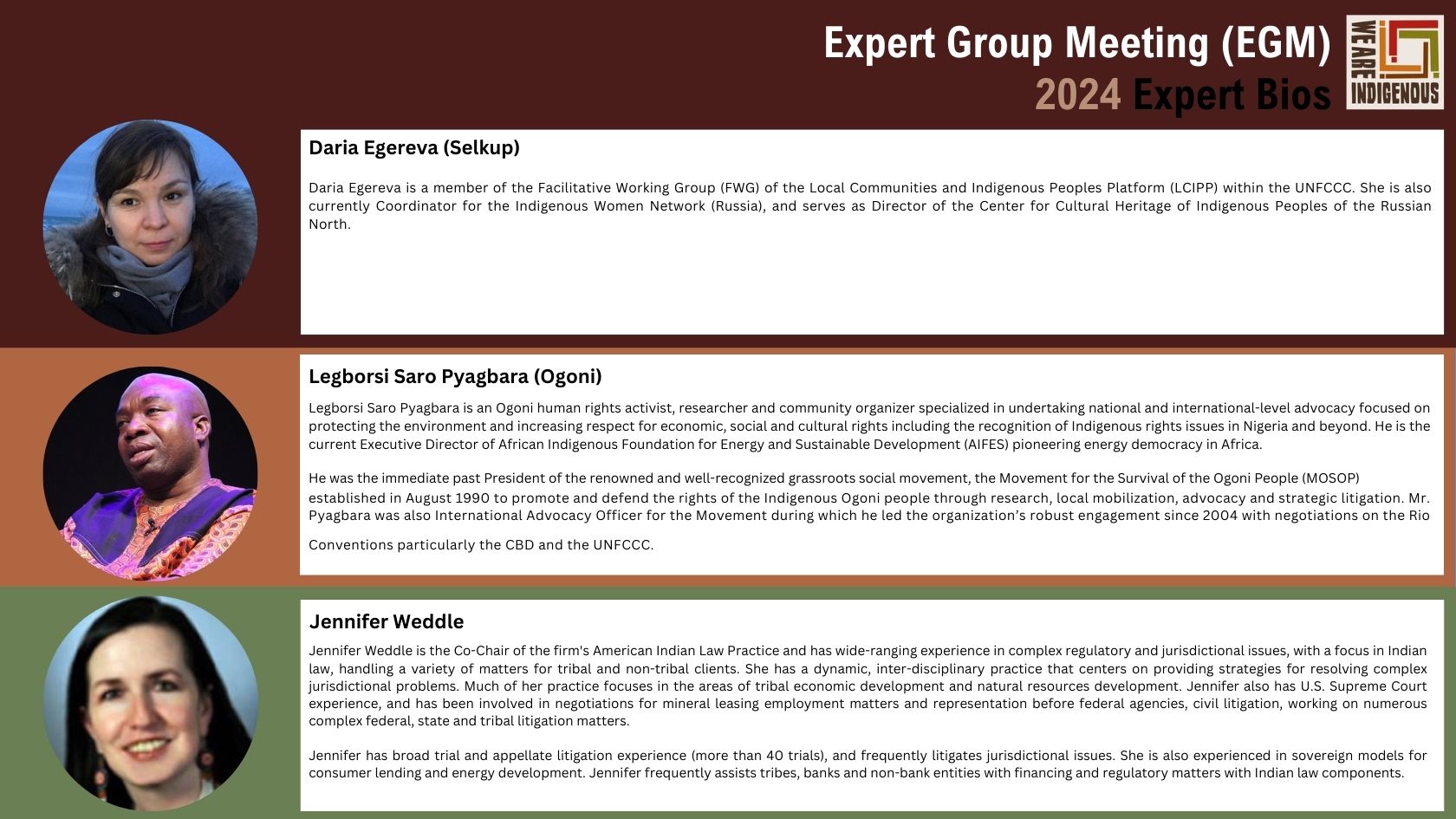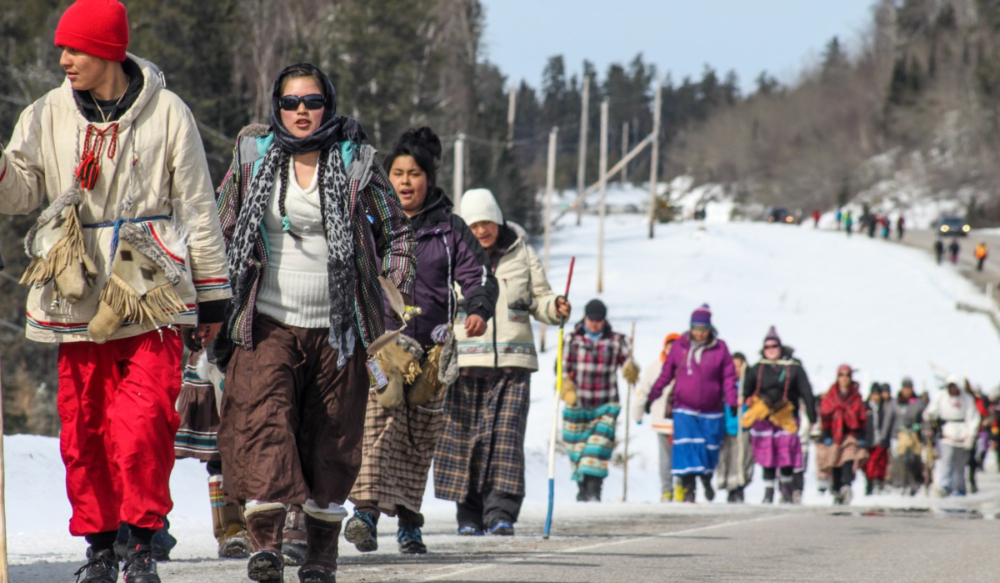
Every year, the Indigenous Peoples and Development Branch within the Division for Inclusive Social Development of the Department of Economic and Social Affairs organizes an international expert group meeting (EGM) on a theme recommended by the Permanent Forum on Indigenous Issues and endorsed by the Economic and Social Council (ECOSOC).
The Permanent Forum at its 2023 session recommended the theme of the Expert Group Meeting (EGM), “Indigenous Peoples in a Greening Economy”.
Date and location: 23 -25 January, 2024 at the University of Colorado Boulder, Colorado USA
Documents
Report AR | EN | ES | FR | RU | ZH
Objectives of the Meeting
The overall objective of the expert group meeting is to mobilize attention and action to more fully integrate the distinct needs and priorities of Indigenous Peoples based on their diverse views of poverty, well-being, and sustainable development in the 2030 Agenda.
- Documenting United Nations mechanisms/bodies or others that support the transition to a green economy while considering the rights of Indigenous Peoples.
- Identifying key considerations based on sustainability and human rights-approach when transitioning to a green economy.
- Assessing structural/institutional barriers that prevent the participation of Indigenous Peoples in sustainable development processes.
- Identifying Indigenous-led initiatives for a just and sustainable transition, acknowledging the importance of both the technological and scientific tools but also traditional and ancestral knowledge of Indigenous Peoples.
- Preparing policy recommendations for all relevant stakeholders.
Guiding Themes and Questions
Theme 1: Outline Indigenous Peoples’ relationship with the environment
- What international standards and recommendations could be applied to the right of Indigenous Peoples to development in accordance with their own needs and interests. e.g. United Nations Declaration on the Rights of Indigenous Peoples, Human Rights Council, UN Permanent Forum on Indigenous Issues, ILO, Kunming-Montreal Global Biodiversity Framework, and others)
- How do the goals and needs of Indigenous Peoples differ from the needs and goals of other interested parties in the relationship with nature in the context of global climate change?
- How does traditional knowledge and the practices of Indigenous Peoples contribute to the protection of the environment?
- What struggles do Indigenous women face when their role and relationship with the environment is broken?
- What is the role of Indigenous youth in protecting the understandings, skills and philosophies developed by their Indigenous societies?
Theme 2: Factors that enable or obstruct the participation of Indigenous Peoples in the green economy
- How have the green economy processes engaged Indigenous Peoples and addressed or failed to address their needs?
- What shifts within States/companies and in partnership with Indigenous Peoples will create the conditions for a green economy?
- How can the free, prior, and informed consent of Indigenous Peoples be ensured when developing green entrepreneurship and green enterprise?
- In what ways does the lack of relevant statistics, information and technical pose an obstacle to Indigenous Peoples’ participation in the green economy?
- Are there training programmes / formal education designed to build capacity to improve Indigenous Peoples access and management to resources?
- How is the UN system working in this area to include Indigenous Peoples?
Theme 3: Case studies on the positive and negative effects of green entrepreneurship and green enterprise on Indigenous Peoples and their communities
- Are Indigenous Peoples developing and carrying out green entrepreneurship and green enterprise (water, energy, land, other) to implement the Sustainable Development Goals?
- How is dialogue, equal representation and participation of Indigenous women and men ensured in all types of negotiations and consultations at all levels?
- Who is providing the funding to implement such projects?
- What three key lessons have been learned from your work with Indigenous Peoples?
- How can examples of lessons learned be transferred among/between regions?
Theme 4: Human rights and corporate responsibility in the shift to a green economy
- What legal mechanisms exist that can incorporate human rights into green economy programmes and projects?
- What legal mechanisms exist to strengthen corporate responsibility in green economy programmes and projects and how might they benefit Indigenous Peoples?
- What safeguards are put in place by States to mitigate the human rights and environmental risks faced by Indigenous Peoples in the shift to green economy? e.g. seeking compensation for damages.
- How can examples of lessons learned be transferred among/between regions?
- How is the UN system working in this area to include Indigenous Peoples?
Theme 5: Develop strategic guidance and action-oriented recommendations for States, intergovernmental organizations, private companies, the United Nations system and Indigenous Peoples organizations to ensure the rights of Indigenous Peoples in the transition towards a more sustainable economy.
Participation
Indigenous Peoples, United Nations agencies, programmes and funds, Member States, non-governmental organizations with ECOSOC status and academics are invited to attend the Expert Group Meeting.
Please note that the United Nations does not provide funding to attend the meeting. Participants are responsible for their own travel, accommodation and related arrangements.
Working Languages:
The working languages will be English and Spanish.
Papers submitted by Experts
The views expressed in these papers are those of the authors and do not necessarily represent those of the United Nations.
- Daria Egereva - Truth, Transitional Justice, Conflict Resolution and Reconciliation: International Law and the United Nations System [EN]
- Freddy Mamni Machaca - La vivencialidad de los Pueblos Indigenas con el medio ambiente [ES]
- Legborsi Saro Pyagbara - Human Rights and Corporate Responsibility in the Shift to a Green Economy: The Experience of the Ogoni Peoples of Nigeria [EN]
- Malih Ole Kaunga - Indigenous Peoples Relationship with the Environment [EN]
- Birgitte Feiring - Inadequate Funding as an Obstacle for Indigenous Peoples' Participation in the Green Economy [EN]
- Caleb Adams - Human Rights and Corporate Responsibility in the Shift to a Green Economy [EN]
- Tom Goldtooth and Tamara Gilbertson - Indigenous Peoples Relationship with the Environment [EN]
- Joan Carling - Indigenous Peoples and the Just Transition: Navigating Impacts, Promoting Equitable and Sustainable Renewable Energy, and Safeguarding Rights [EN]
- Angele Alook - Indigenous Perspectives on Greening the Economy: How do Indigenous Climate Leaders from Turtle Island Perceive the Green Economy? [EN]
- Whitney Gravelle - Relationships with Land and Water: Confronting the Line 5 Dual Pipelines [EN]
- Eriel Deranger - Human Rights and Corporate Responsibility in the Shift to a Green Economy [EN]
- José Beymar Cruz Morales - El Salar de Uyuni y el desarrollo de los Pueblos Indígenas originarios y campesinos [ES]
- Jennifer Weddle (presentation) - Human Rights and Corporate Responsibility in the Shift to a Green Economy [EN]
- José Francisco Calí Tzay, Special Rapporteur on the rights of Indigenous Peoples (statement) [EN]
Expert Biographies
Resources
-
United Nations Declaration on the Rights of Indigenous Peoples [AR] [EN] [ES] [FR] [RU] [ZH]
-
State of the World’s Indigenous Peoples, Vol. 5, Rights to Lands, Territories and Resources [EN]
-
Challenges and Opportunities for Indigenous Peoples’ Sustainability. Policy briefing No. 101, UNDESA (2021) [EN]
-
Climate Change Solutions [EN]
-
The reality of REDD+ in Peru: Between theory and practice [EN]
-
Green economy: a path towards sustainable development and poverty eradication, UNRIC [EN]
-
Uncovering pathways towards inclusive green economy, UNEP [EN]
-
Green economy, UNEP [EN]
-
What is an inclusive green economy?, UNEP [EN]
-
Local and Indigenous Knowledge Systems and Climate Change, UNESCO [EN]
-
PACT (Pathways Alliance for Change and Transformation). (2023). Indigenous Peoples, local communities, and trade in terrestrial carbon markets: Time to recognize their rights, support their organizations, and impose a moratorium on terrestrial carbon trade. Ann Arbor: Pathways Alliance for Change and Transformation Executive Summary / Position Paper
Studies and reports prepared by the United Nations Mechanism on the rights of Indigenous Peoples
-
Green financing, a just transition to protect Indigenous Peoples’ rights. Report of the Special Rapporteur on the rights of Indigenous Peoples, Jose Francisco Cali Tzay. (A/HRC/54/31)
-
Impact of militarization on the rights of Indigenous Peoples. Study by the Expert Mechanism of the Rights of Indigenous Peoples (A/HRC/54/52)
-
Indigenous Peoples, Business, Autonomy and the Human Rights Principles of Due Diligence, including Free, Prior and Informed Consent. Report of the International Expert Group Meeting (E/C.19/2022/6)
-
Indigenous Peoples: Development with Culture and Identity Articles 3 and 32 of the United Nations Declaration on the Rights of Indigenous Peoples. Report of the International Expert Group Meeting (E/C.19/2010/14)
-
Study on the need to recognize and respect the rights of Mother Earth (E/C.19/2010/4)
 Welcome to the United Nations
Welcome to the United Nations
